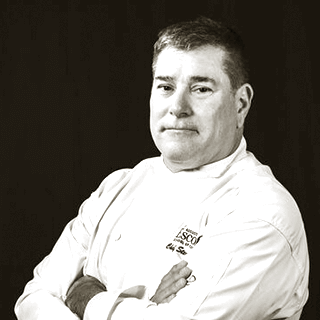CULINARY SCHOOL ONLINE
Earn a culinary arts degree or diploma at one of the best culinary schools in the USA.*
Explore More Programs
Discover the culinary speciality that’s right for you!
Online Programs
Austin Campus
Next start date: Oct 1
Online Culinary School Can Help You Gain a Professional Edge
With Escoffier’s online culinary degree or diploma program, you can gain a foundational understanding of culinary techniques and practical business skills that can set you apart from your peers.
Culinary school can prepare you for exciting culinary careers in venues like:
- Restaurants
- Hotels
- Resorts
- Country clubs
- Catering companies
Learn more about online cooking school, the curriculum, the Farm To Table® Immersion, and what makes Escoffier unique.
REQUEST MORE INFO
60 weeks*
Escoffier’s online culinary arts programs are designed to work with your schedule. In a little more than a year, you could earn a diploma or degree that sets you apart.
54%
The percentage of Escoffier Boulder students (including online programs) who received an income-based federal Pell grant and/or a grant or scholarship from another source, per National Center for Education Statistics.
$7,663
For all students, the average amount of aid awarded in the form of federal student loans in 2022-23 was $7,663, according to the National Center for Education Statistics.
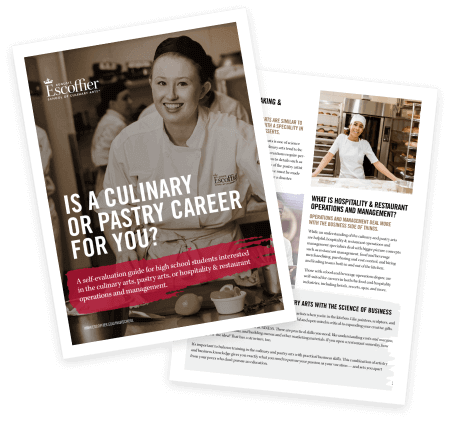
Professional Online Culinary Classes Plus Business and Career Training
Escoffier’s online curriculum is designed to provide you with the necessary knowledge to help you pursue your dream culinary career.
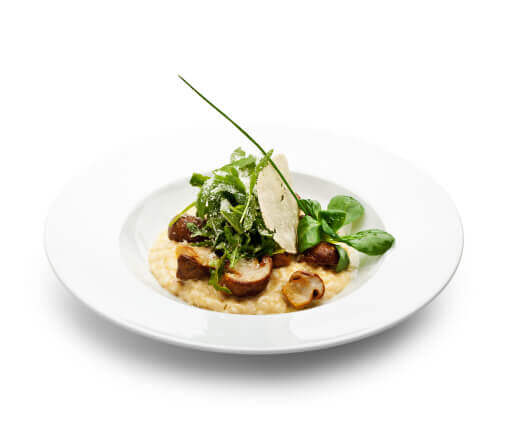
Now you can attend an accredited culinary school with a national reach right from the convenience of your own kitchen.
Our online programs offer a culinary education that includes cooking techniques and business principles, just like our on-campus programs.
Keep reading to learn more about the curriculum, our online culinary classes, and even lesson examples for the culinary arts degree and diploma programs.
- Attend or review recordings of weekly virtual classes
- Receive personalized feedback from professional Culinary Arts Chef Instructors
- Earn your culinary degree or diploma from almost anywhere in the world
This course begins with food safety and sanitation in the professional kitchen, including proper hygiene, food handling, food storage, cleaning, pest control, in a food service operation. Students become acquainted with tools, utensils, and equipment in professional food service and discuss kitchen layout.
Fundamental knife skills, cutting techniques, and the concept of mise en place are covered. Production of stocks, soups are included along with an introduction to grain and legume cookery. And introduction to the role of heat in various cooking techniques rounds out a foundational knowledge in culinary arts.
This course equips students with essential tools and skills to thrive in their culinary studies and prepare for future success in the culinary industry. Students will develop effective time management strategies, refine professional communication skills, and gain valuable insights into available Student and Career Services. The course is designed to set learners on a path toward achieving their academic and professional goals.
This course offers a deeper level continuation of understanding of foundational culinary skills. Students will be introduced to various dry-heat, moist-heat and combination-heat cooking techniques, as well as understand the role of the five Mother Sauces in cuisine. A greater emphasis on knife cuts and accuracy is focused upon, and plating and presentation are introduced to give students the basic skills necessary to advance in a culinary arts education.
This course covers the different types of commercial food service operations, and how to manage each using the principles of good service. Students study the hierarchy of management in food service, and the skills needed to succeed as a manager: training employees, motivating them, disciplining them, and creating a safe and positive work environment. The course also explores how to act responsibly and make decisions that benefit the company.
This course covers ingredient function, leavening agents and mixing methods related to doughs with an emphasis on understanding bakeshop techniques to produce savory results. Production of quick-doughs and batters, flatbreads, yeast-raised-doughs, various formations and related accompaniments.
The Garde Manger is responsible for cold foods, including salads, sandwiches, dressings, pâtés, cold hors d’oeuvres, and various buffet items. Students will prepare items to be served cold in a sanitary and appealing way, and learn about various cold kitchen production techniques, including methods of preserving meat and produce.
Students have the opportunity to gain an understanding of American Regional cuisine by exploring history, traditional and indigenous ingredients, flavor components, and cooking techniques. Application of classical and contemporary cooking techniques, plate design, and application of proper sanitation techniques.
This course explores different types of menus and their applications. The course covers all aspects of menu planning and design, ranging from visual design to price analysis to making use of available resources. The menu is both a financial tool and a communication tool, and its use as both is explained. Students learn about both food and beverage menus.
Students have the opportunity to gain an understanding of Western European cuisines by exploring history, traditional and indigenous ingredients, flavor components and cooking techniques. Application of classical and contemporary cooking techniques, plate design, and application of proper sanitation techniques.
This course provides the students with a hands-on experience on a working farm/ranch or vineyard/orchard. The Instructor conducts the lecture and lab activities to coincide with the harvested item(s) for a catered event executed by the students. Students in the residential delivery of the course, under the direction of a Farmer/Rancher collect or harvest foods and/or proteins for the students’ lab activities.
This class also focuses on the ever-growing relationship between the chef and the farm/factory/ranch. This course will result in a daily lab menu production of selected sustainable and/or organic foods. Also presented will be concepts of traditional and nontraditional farming and sourcing for vegetables, as well as the impact of land and sea animal-based food sourcing as practiced globally.
Three out of five foodservice operations fail within five years of opening, often due to money mismanagement; this course gives students the skills to not only keep their restaurant in business but also turn a profit.
This course introduces students to purchasing, receiving, inventory management and menu pricing. Students learn how to minimize costs and maintain a full range of customer services.
The course progresses from the fundamentals of culinary math into an overview of storeroom operations, inventory, portion control, as purchased and edible portions, ingredient conversions, and recipe costing.
This course is a culmination course in entrepreneurship. This course covers such topics as business planning, pricing, credit management, government regulation, legal concerns. Business ethics and the crucial role and importance of management and leadership are also covered. For the final project for this course, the student will complete and present a business plan for a food service operation.
This course provides opportunities for real life experiences in an operational restaurant or related business and builds on the skills and techniques covered in previous courses. Externship courses are specific to the area of program concentration and must be completed for each concentration in which a student is enrolled. Externship must be completed for each new program enrollment.
Three out of five restaurants fail within five years of opening, often due to money mismanagement; this residential program course gives students the skills to not only keep their restaurant in business but also turn a profit. In this course, students study the hierarchy of management in food service, and the skills needed to succeed as a manager: training employees, motivating them, disciplining them, and creating a safe and positive work environment.
This course explores different types of menus (including both food menus and beverage menus) and their applications. Aspects of menu planning and design, ranging from visual design to price analysis to making use of available resources are covered.
This course equips students with essential tools and skills to thrive in their culinary studies and prepare for future success in the culinary industry. Students will develop effective time management strategies, refine professional communication skills, and gain valuable insights into available Student and Career Services. The course is designed to set learners on a path toward achieving their academic and professional goals.
This course begins with food safety and sanitation in the professional kitchen, including proper hygiene, food handling, food storage, cleaning, pest control, in a food service operation. Students become acquainted with tools, utensils, and equipment in professional food service and discuss kitchen layout.
Fundamental knife skills, cutting techniques, and the concept of mise en place are covered. Production of stocks, soups are included along with an introduction to grain and legume cookery. And introduction to the role of heat in various cooking techniques rounds out a foundational knowledge in culinary arts.
This course offers a deeper level continuation of understanding of foundational culinary skills. Students will be introduced to various dry-heat, moist-heat and combination-heat cooking technqiues, as well as understand the role of the five Mother Sauces in cuisine. A greater emphasis on knife cuts and accuracy is focused upon, and plating and presentation are introduced to give students the basic skills necessary to advance in a culinary arts education.
The Business & Professional Communications course emphasizes the principles and practical application of effective professional communication behaviors within professional, business, and organizational contexts. In addition to identifying the importance of effective communication skills to the hospitality industry, communication styles and effective listening methods are addressed.
Students will create and present oral presentations including cooking demonstrations, and special occasion speaking. Listening skills, verbal and nonverbal communication, conflict resolution, cultural differences in communication, and debate techniques are also covered.
Throughout history, food has done more than just provide nourishment. From prehistoric times to the present day, food and the pursuit of it has had a transformative role in human history. Food has impacted societal organization, industrial development, military conflict, and economic expansion. As epicure and gastronome, Jean-Anthelme Brillat-Savarin stated, “Gastronomy governs the whole of human man.” In addition, food also serves a role in the cultural development of religion, economics, and politics. This course examines the role of food and its contribution and influence over history, culture, religion, economics, and politics. Food customs and attitudes are also explored, as well as, the social awareness selected food patterns and customs.
This course covers ingredient function, leavening agents and mixing methods related to doughs with an emphasis on understanding bakeshop techniques to produce savory results. Production of quick-doughs and batters, flatbreads, yeast-raised-doughs, various formations and related accompaniments.
The Garde Manger is responsible for cold foods, including salads, sandwiches, dressings, pâtés, cold hors d’oeuvres, and various buffet items. Students will prepare items to be served cold in a sanitary and appealing way, and learn about various cold kitchen production techniques, including methods of preserving meat and produce.
Foodservice Math & Accounting introduces students to managerial accounting concepts and explains their applications to specific operations within the hospitality industry. Emphasis is placed on how to administer accounting procedures to minimize costs and maintain a full range of customer services.
After summary of the fundamentals of culinary math, an overview of basic business accounting transactions is covered including asset/liability accounts such as accounts receivable and payable, ledgers, balance sheets, payroll and financial statements.
Technical Writing for the Hospitality Industry, prepares students to write in the hospitality and foodservice professions. In a professional setting, writing provides readers information they need in a format they can understand.
Unlike most academic writing, in which students demonstrate their learning to a professor who already knows the subject, in technical communication the writer is the expert, and the readers are the learners. In the hospitality and foodservice industries, students and professionals write a variety of documents for supervisors, colleagues, and customers such as explaining a problem or product, preparing a proposal, or illustrating a project. This course teaches students to adapt their writing to different audiences and purposes.
This course outlines strategies for making subjects clear to readers who need to understand them. To communicate effectively with an audience, writing must meet rigorous editing standards, in addition to writing in a clear, concise style and presenting information logically.
Students have the opportunity to gain an understanding of American Regional cuisine by exploring history, traditional and indigenous ingredients, flavor components, and cooking techniques. Application of classical and contemporary cooking techniques, plate design, and application of proper sanitation techniques.
Students have the opportunity to gain an understanding of Western European cuisines by exploring history, traditional and indigenous ingredients, flavor components and cooking techniques. Application of classical and contemporary cooking techniques, plate design, and application of proper sanitation techniques.
In the Science of Nutrition course, the basic principles of nutrition are investigated. Emphasis is placed on the nutrients, food sources, and their utilization in the body for growth and health throughout life. Contemporary and global nutritional issues are also discussed.
This course is a culmination course in entrepreneurship. This course covers such topics as business planning, pricing, credit management, government regulation, legal concerns. Business ethics and the crucial role and importance of management and leadership are also covered. For the final project for this course, the student will complete and present a business plan for a food service operation.
This course provides the students with a hands-on experience on a working farm/ranch or vineyard/orchard. The Instructor conducts the lecture and lab activities to coincide with the harvested item(s) for a catered event executed by the students. Students in the residential delivery of the course, under the direction of a Farmer/Rancher collect or harvest foods and/or proteins for the students’ lab activities.
This class also focuses on the ever-growing relationship between the chef and the farm/factory/ranch. This course will result in a daily lab menu production of selected sustainable and/or organic foods. Also presented will be concepts of traditional and nontraditional farming and sourcing for vegetables, as well as the impact of land and sea animal-based food sourcing as practiced globally.
This course provides opportunities for real life experiences in an operational restaurant or related business and builds on the skills and techniques covered in previous courses.
Externship courses are specific to the area of program concentration and must be completed for each concentration in which a student is enrolled. Externship must be completed for each new program enrollment.
This course provides additional opportunities for real life experiences in an operational restaurant or related business and builds on the skills and techniques covered in previous courses.
Externship courses are specific to the area of program concentration and must be completed for each concentration in which a student is enrolled. Externship must be completed for each new program enrollment.
Farm To Table® Immersion for Online Students*
Escoffier hosts a quarterly Farm To Table® immersion, where online students have the option to visit the Boulder residential campus for an in-person, hands-on experience to work directly with farmers. Learn more about upcoming events.
Possible farm experiences and observations may include:
- Harvesting
- Livestock
- Dairy
- Planting
- Cheese making
- Greenhouses
- Composting and preserving

Farm To Table® Experience
All Programs Include an In-Person Industry Externship
You can gain hands-on experience in the industry
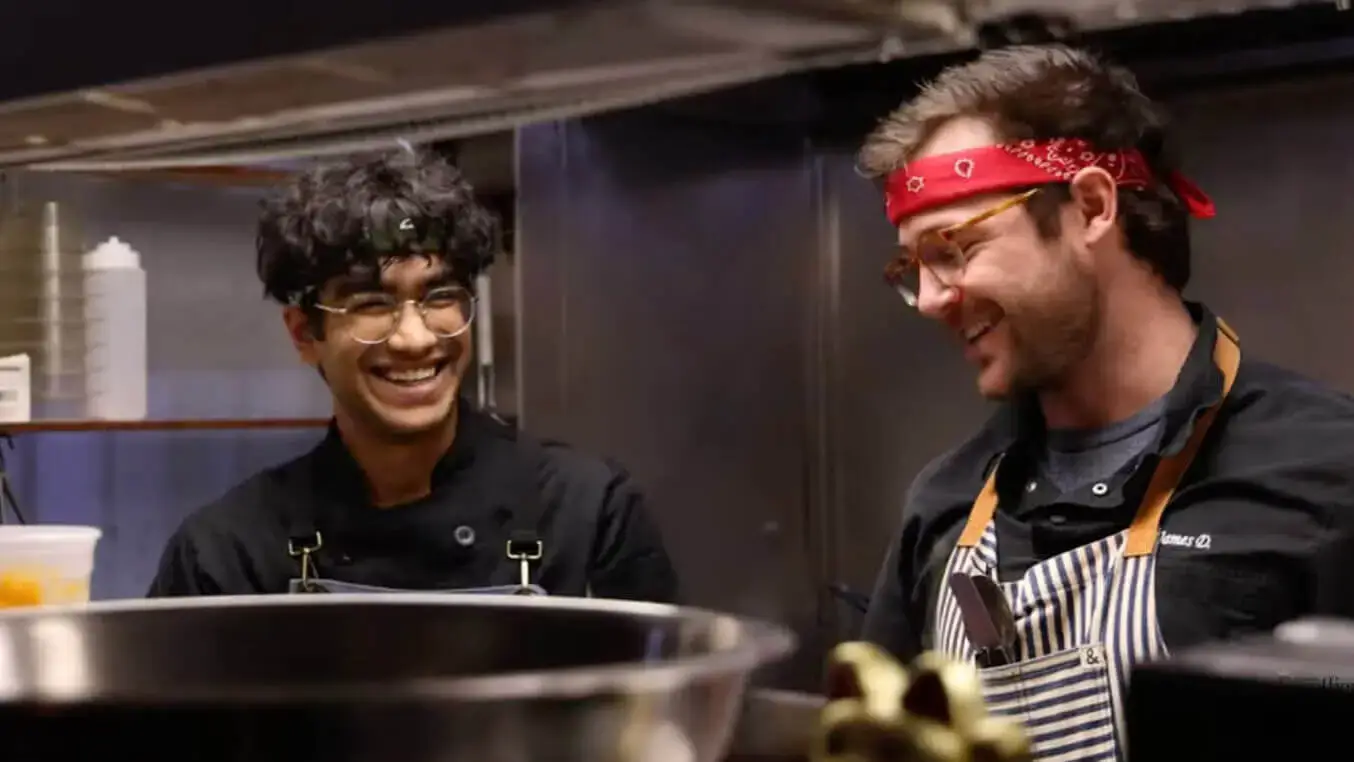
Options to Help You Afford Culinary School
*59% of Boulder students who entered postsecondary education for the first time received some financial assistance in 2022-23 for those who applied and qualified, College Navigator, National Center for Education Statistics
*International students are not eligible for Title IV financial aid
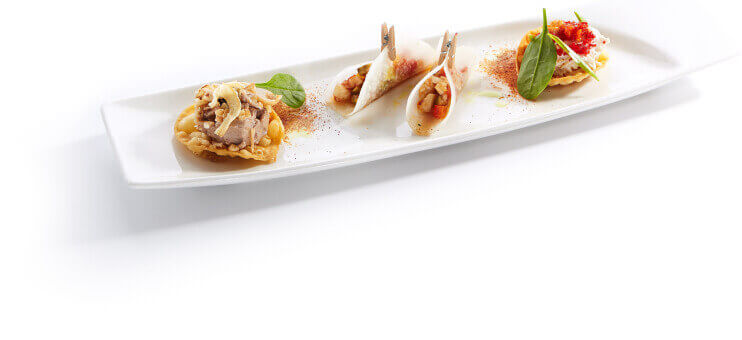
Escoffier’s online programs are available through the Boulder, Colorado, campus. The average net price was $11,554 after grant or scholarship aid for students in the largest program for the time in academic year 2022-23.*
*College Navigator, National Center for Education Statistics
Program Cost: $35,145†
Program Length: 60
weeks*
No Application Fee!
Apply NowProgram Cost: $23,272†
Program Length: 60
weeks
No Application Fee!
Apply Now†The total program cost listed above encompasses tuition, tool kit, uniform, and an optional non-refundable technology fee if you do not already have a computer. As textbooks are delivered electronically, the cost of books used in the program and available online to the students are included in the tuition cost. For more cost details, refer to our catalog.
*Time to complete may be extended due to Distance Education course sequencing.
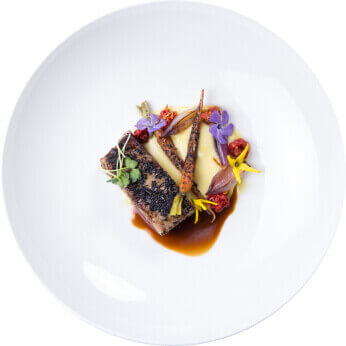
Academic weeks required to complete the degree or diploma program.
Hours per week recommended for academics, depending on the student’s learning style.*
Approximate time required to complete an online application. Apply today!
A proven, flexible option for students with busy lifestyles
Online culinary school offers a flexible and modern approach to culinary education, allowing aspiring chefs and food enthusiasts to develop their skills without the constraints of a traditional classroom setting.
Utilizing a blend of video tutorials, interactive assessments, and videos from professional Chef Instructors, our culinary programs cover a wide range of topics from basic knife skills and ingredient sourcing to techniques in various international cuisines.
The online culinary format allows you to receive the same core training as you would on-campus from the comfort and convenience of your own home.
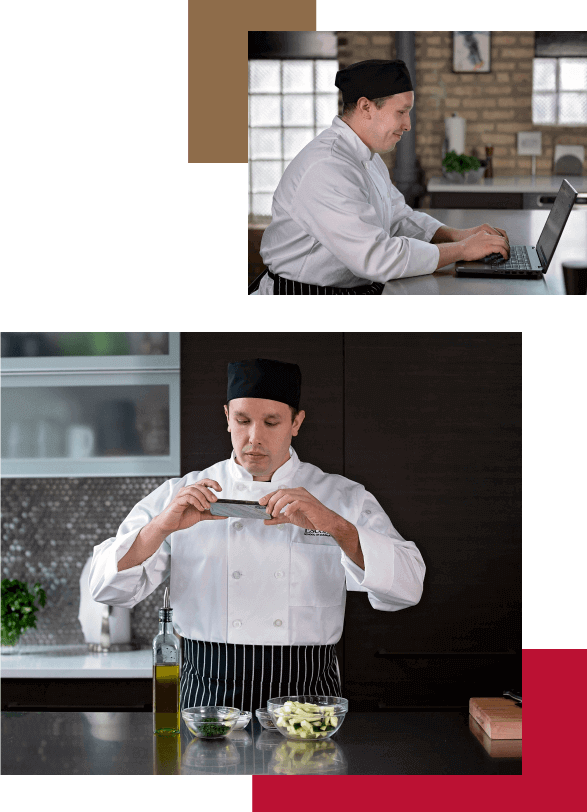
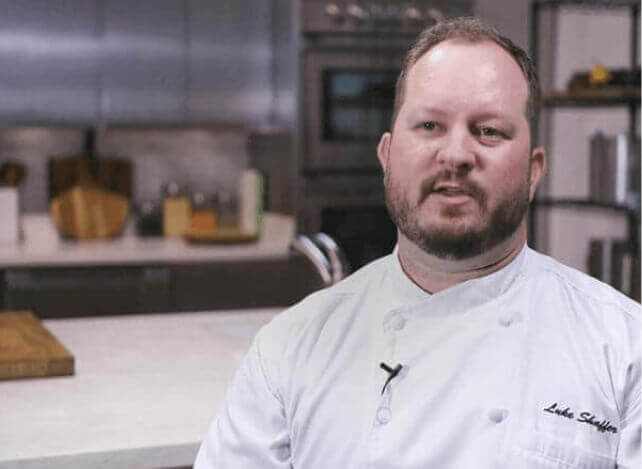
The online programs at Escoffier allow students to develop the same skills as ground campus students, but you complete the program in your own kitchen.”
Escoffier’s Online Learning Model Explained

LEARN

DISCUSS
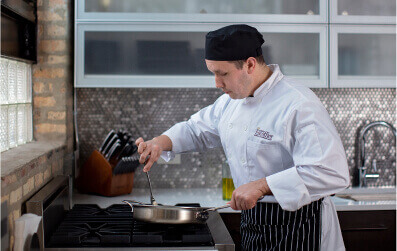
EXPERIENCE
Meet Your Online Culinary Arts Chef Instructors
Pursue your online culinary degree or diploma at Escoffier, guided by those who are passionate about helping you turn your dreams into a reality.
Escoffier Chef Instructors are enthusiastic guides who recognize the unique potential in students, teaching culinary techniques through a supportive learning environment.
With personalized mentorship, our instructors can empower you to set ambitious goals and navigate the path to culinary excellence with confidence.
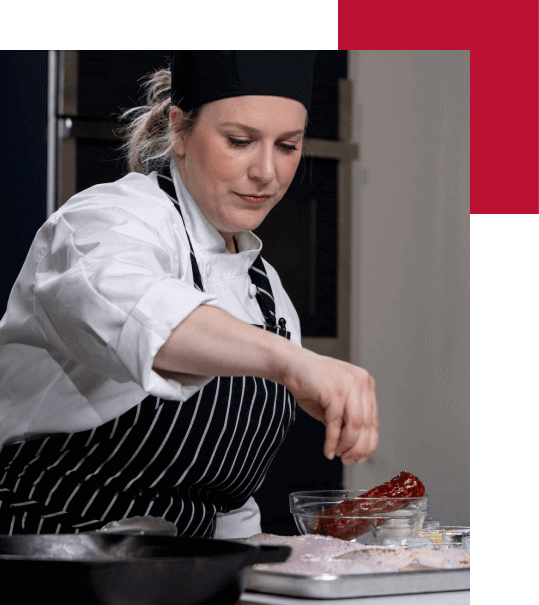
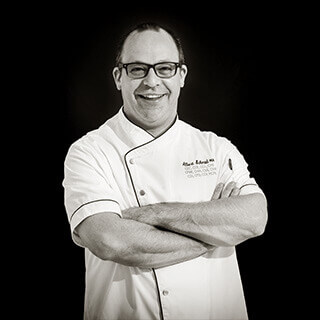
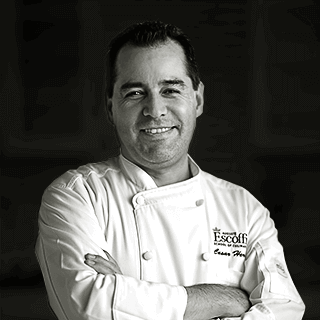
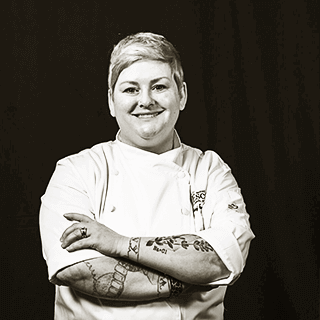
Get a glimpse into the topics taught in online culinary school
Here are some examples of the many lessons that our online culinary courses have to offer.
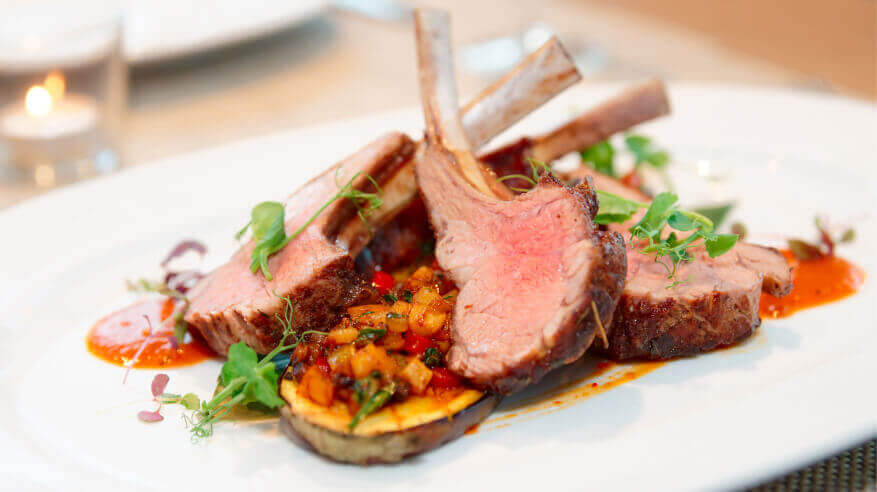
Receive culinary training to create new recipes that build on classic techniques
- Design and experiment with your own unique blend of ingredients.
- Begin to develop your palate through culinary arts courses that expand your sensory awareness and enhance your ability to create innovative flavor pairings.
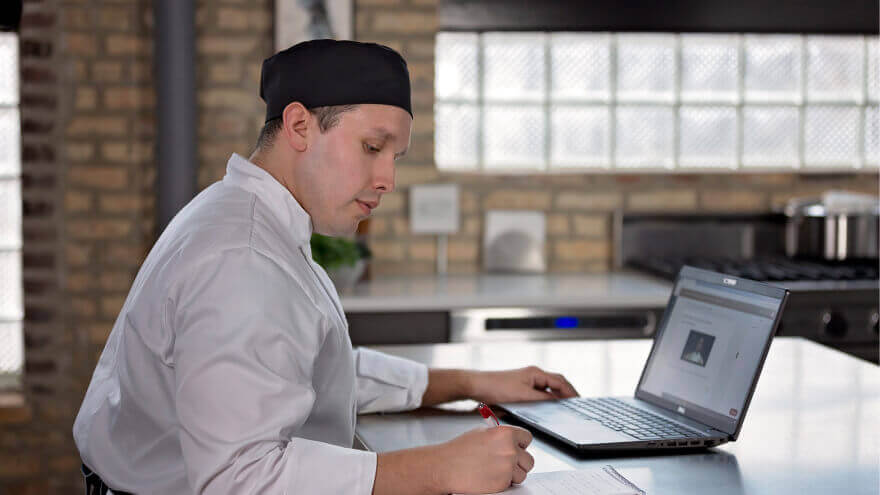
Learn effective communication skills that can help you succeed as a culinary professional
- Discuss the importance of effective communication styles and listening methods in the culinary industry.
- Learn techniques for conflict resolution and cultural differences in communication.
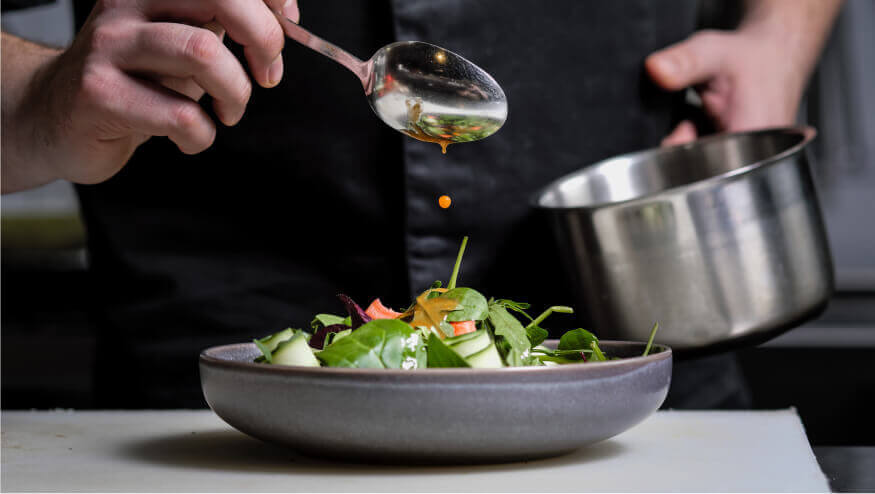
Gain an understanding of the science behind learning to cook nutritious dishes
- Discover nutrients, food sources, and their utilization in the body for growth and health throughout life.
- Study nutrition issues to keep up-to-date with the current nutritional climate.

Practice math and accounting skills for a professional culinary career in hospitality
- Learn restaurant accounting procedures that minimize costs and maintain a full range of customer services.
- Gain an understanding of liability accounts such as ledgers, balance sheets, payroll, and financial statements.
Accredited and Respected Worldwide
The reputation of the institution where you earn your degree or diploma is an important measure of value. Escoffier is recognized industry-wide as a leader in culinary education. The Boulder, Colorado, campus develops and delivers Escoffier’s online programs. It is accredited by the Accrediting Council for Continuing Education & Training (ACCET) and is approved and regulated by the Colorado Department of Higher Education, Division of Private Occupational Schools.
*Based on comparable student population data for Austin and Boulder as currently reported in Integrated Postsecondary Education Data System (IPEDS).
My education with Escoffier has really given me a good foundation. It has filled a resume gap; it’s filled a professional gap and a skills gap. It has helped me in all aspects of my culinary career.”*
*This information may not reflect every student’s experience. Results and outcomes may be based on several factors such as geographical region or previous experience.
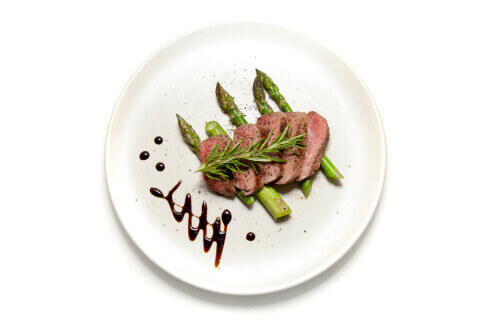
Unlock a diverse range of culinary careers with an online culinary arts degree or diploma
A culinary arts degree or diploma can open the door to exciting careers in food. Our program is designed to equip graduates with the skills and knowledge needed to thrive.
You could find yourself well-prepared to step into coveted roles in top-notch venues including prestigious restaurants, resorts, or even your own restaurant if that is your dream.
Employment for cooks is projected to grow 6% from 2022 to 2032, twice as fast as the average growth for all occupations.*
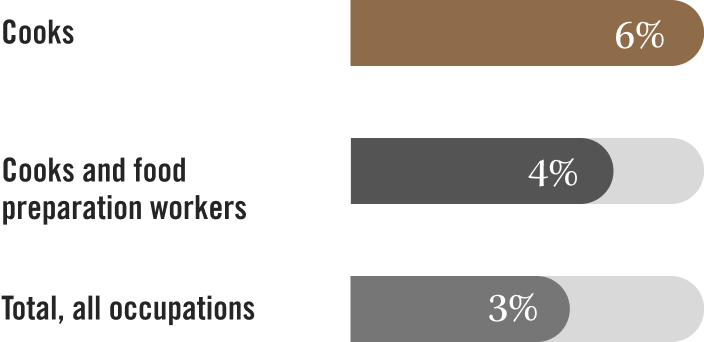
*Occupational Outlook Handbook, U.S. Bureau of Labor Statistics
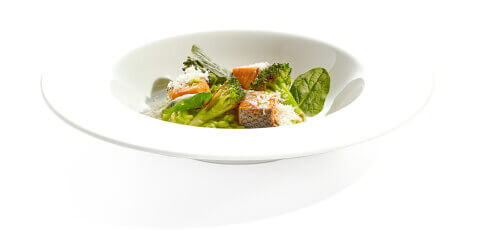
new restaurant jobs
will be added to the economy between 2020-2030, a total increase of 48.9%.*
*Long-Term Occupational Projections (2020-2030), U.S. Department of Labor

EXAMPLE Job Titles
- Recipe Developer
- Line Cook
- Catering Assistant
- Banquet Cook
- Garde-Manger
- Food Critic
- Food Stylist
- Prep Cook
- Personal Chef
- Roundsman
- Menu Planner
EXAMPLE Employers
- Fine Dining Restaurants
- Hotels & Resorts
- Catering Companies
- Cruise Lines
- Private Clubs
- Food Styling Agencies
- Food Trucks
- Resorts & Spas
- Retirement Communities
- Corporate Dining
- Supermarkets
Some Esteemed Employers that Have Hired Escoffier Graduates
Explore Careers and Externships in The Career Center
Get “insider knowledge” on how you can uncover career opportunities with our employer partners.
Career Planning
Resume and Portfolio Assistance
Interview Preparation
Escoffier’s Admissions Requirements
To enroll at Escoffier and get started in the culinary arts degree or diploma program, you must show proof of a high school diploma or general equivalency diploma (GED). You do not need any specific work experience, nor do you have to take the ACT or SAT to be admitted to any program at Escoffier. For more information, see our catalog.
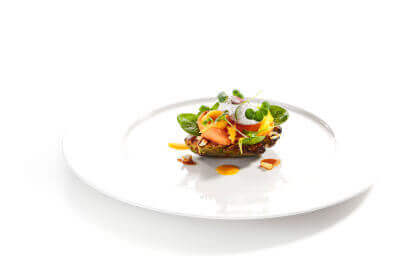
Frequently Asked Questions About Our Online Culinary Arts Programs
How much does online culinary school cost?
Total program costs for the online diploma in Culinary Arts and Operations is $23,272, and the total program cost for the online Associate of Occupational Studies degree in Culinary Arts is $35,145.* See the costs for all programs here.
*The total program cost listed above encompasses tuition, tool kit, uniform, and an optional non-refundable technology fee if you do not already have a computer. As textbooks are delivered electronically, the cost of books used in the program and available online to the students are included in the tuition cost. For more cost details, refer to our catalog.
Financial aid is available for those who apply and qualify.
You can learn more about the financial aid process and speak with a financial advisor to help guide you through the process.
Are Escoffier’s culinary arts programs 100% online?
Escoffier offers both online and on-campus culinary arts programs. The online culinary arts degree and diploma programs are completed fully online, which also includes a hands-on industry externship where they gain real world experience in an operational restaurant or related business.
If you are interested in studying culinary arts at a ground campus, see more information here about our campuses in Austin, Texas and Boulder, Colorado.
Is Auguste Escoffier School of Culinary Arts accredited?
Yes! Escoffier is the only U.S.-accredited institution offering 100% online diplomas and degrees nationwide with culinary classes and hands-on industry externships.*
Our online programs are available through the Boulder campus. Auguste Escoffier School of Culinary Arts in Boulder, Colorado is nationally accredited by the Accrediting Council for Continuing Education and Training (ACCET).
It is also approved and regulated by the Colorado Department of Higher Education (CDHE), Division of Private Occupational Schools. Auguste Escoffier School of Culinary Arts (Boulder, CO) has been approved by CDHE to participate in the National Council for State Authorization Reciprocity Agreements (NC-SARA).
Escoffier earned this accreditation by designing the entirety of the curriculum, and hiring faculty that fully supports online learning. This is particularly important due to Escoffier’s culinary arts programs being offered 100% online with an in-person industry externship.
*Our Boulder, CO campus is the only accredited institution in the United States to offer both fully online diploma and degree programs nationwide with culinary classes and hands-on industry externships. We are accredited by ACCET – A Partnership for Quality®. ACCET is listed by the U.S. Department of Education as a nationally recognized accrediting agency.
How do I enroll in online culinary school at Escoffier?
Thinking about attending an online cooking school? Enrolling in online culinary school at Escoffier takes place on our convenient online platform and typically requires only about 10 minutes to complete the application.
Our guide “How You Can Get into Culinary School” can provide an overview of the steps that you may need to take to enroll in Escoffier. You can also reach out to the Admissions Department for assistance during the process. Applications are accepted continuously for programs.
When you apply, you’ll need to provide the following information:
- Your location and demographics
- Emergency contact information
- Program of interest
- Proof of graduation
- Valid driver’s license, passport, or photo I.D.
After completing the application, you will be prompted to review and submit it. You will then receive an enrollment agreement packet through DocuSign.
Once your application is complete, a representative from the Admissions Team will reach out to discuss the next steps.
This is also an opportunity to consult with the Student Finance Department to explore various financing options. Financial aid is available to those who apply and qualify, and many of our students utilize financing options to fund their education.
What if I’m an international student living outside of the U.S.?
If you live outside of the U.S. and are interested in our programs, we’re here to help! Visit our International Students page to learn about admissions, visa support, and everything you need to get started.
Is financial aid or scholarships available to attend online culinary school?
Yes! Financial aid is available to students who apply and qualify.
During the 2022-2023 academic year, the majority of first-time postsecondary education students at Escoffier who applied and qualified received some form of financial assistance.*
*59% of Boulder students (including online programs) who entered postsecondary education for the first time received some financial assistance in 2022-23 for those who applied and qualified, per College Navigator, National Center for Education Statistics.
If you’re a student, we encourage you to contact our Financial Aid Department to explore your eligibility for grants or federally-backed loans.
Scholarships are also available for online Escoffier students who apply and qualify, including Work & Learn Scholarships, the Student Veteran Scholarship, and merit-based scholarships.
Learn more about the scholarships that you may qualify for.
How does online culinary school work?
Online culinary school at Escoffier works through a combination of digital resources and hands-on experiences. Each week, students engage with assigned readings and video content to learn new culinary terms and techniques. They also participate in live virtual sessions led by professional Chef Instructors and complete weekly assignments in their own kitchens, documenting their progress with photos and written summaries. Some education takes place outside the kitchen, as well, where students take business-related classes that may have non-cooking assignments.
The online format can provide flexibility and allow students to study from home (except the externship) and complete coursework around their schedules.
If you would like to learn more about the process, please check out: How Online Culinary School Works.
How do I get graded on my cooking assignments at Escoffier if the instructor is not there to see or taste anything?
At Escoffier, even though your instructor isn’t physically present to observe or taste your cooking assignments, you can still expect to receive feedback on your dishes. Assignments are evaluated based on comprehensive documentation, including detailed photos and written summaries, which demonstrate your techniques, presentation, and adherence to recipes. Tools like the Escoffier flavor wheel can help you articulate the taste of your dishes. Your Chef Instructor will review your work, offering feedback and tips to refine your skills.
If you would like to learn more about the process, please check out: How Online Culinary School Works.
How much time per week is required for classes at the Escoffier online culinary school?
The time commitment for classes at Escoffier’s online culinary school typically ranges between 15-23 hours per week spent on school-related activities depending on program, credential, and personal pace. This includes time spent on reading assignments, watching video content, participating in live virtual sessions, completing cooking assignments and other tasks, and engaging in discussions with fellow students. The flexibility of online culinary classes allows students to fit their coursework into their schedules, making it a viable option for those with other commitments, such as work or family responsibilities.
Read more about the length of our programs here: How Long Does It Take to Finish Culinary School?
Note: All clock hours are based on average or expected time to complete an activity or category of activities. Some students may require more or less time to complete course requirements.
How long does it take to complete online culinary school on average?
The online Culinary Arts and Operations Diploma program’s 59 quarter credits can be completed in 890 clock hours over 60 weeks. Similarly, the Associate of Occupational Studies Degree in Culinary Arts consists of 90 quarter credits, and is estimated to take 1,340 clock hours over 60 weeks.* Time to completion for the Associate of Occupational Studies Degree in Culinary Arts might be contingent upon previously completed, qualifying credits from specific diploma programs.
Read more about the length of our programs here: How Long Does It Take to Finish Culinary School?
Note: All clock hours are based on average or expected time to complete an activity or category of activities. Some students may require more or less time to complete course requirements.
*Time to complete may be extended due to Distance Education course sequencing.
Is online culinary school worth it?
Online culinary school could be a worthwhile investment for many students. It can offer flexibility, allowing you to study from almost anywhere with internet and kitchen access and fit your education around other commitments. Culinary programs like those at Escoffier can provide a comprehensive curriculum, including hands-on industry externships that can prepare students for a variety of careers in the culinary field.
Culinary school can also offer several advantages over just learning on the job. In a professional kitchen, cooks may be responsible for executing predetermined recipes repeatedly, which can limit their exposure to different techniques and cuisines. In contrast, culinary school can provide the opportunity to explore a wider variety of food styles and culinary traditions from around the world. Additionally, Chef Instructors may be able to explain the science behind ingredients and techniques, helping students develop a deep understanding of the culinary arts.
A culinary degree or diploma may also show a candidate’s commitment to the profession, which can be crucial in the hiring process for employers. Recruiting and training new cooks or chefs is a time-consuming and costly process, often running into the thousands of dollars. Therefore, executive chefs are seeking dedicated employees who are committed to staying with the organization for the long term. A culinary degree can demonstrate that the candidate is serious about the kitchen and is not just looking for a temporary job.
Culinary schools can also be valuable for networking. When an employer has a position to fill, they often think about their network and who they know that might be a good fit. They’ll then reach out to their industry connections to see if they know of any good candidates. Having a solid network of cooks and chefs that you’ve built from your time in culinary school could be critical during a culinary career.
Check out our article on the pros and cons of attending culinary school for help deciding if it’s right for you.
Is Auguste Escoffier School of Culinary Arts the best online culinary school in America?
Auguste Escoffier School of Culinary Arts has been recognized by Niche as the #1 best college for culinary arts in America in 2025.
It is known for its experienced Chef Instructors, innovative online curriculum, and emphasis on sustainable and farm-to-table practices. The curriculum can cover a wide range of topics, from basic cooking techniques, menu design, world cuisine, business skills, to advanced culinary concepts. Additionally, Escoffier’s online programs include hands-on industry externships, which can provide valuable real-world experience for students in a professional kitchen setting.
In addition to its online culinary programs, Escoffier also offers online programs in Baking and Pastry Arts, Food Entrepreneurship, Plant-Based Culinary Arts, Holistic Nutrition & Wellness, and Hospitality & Restaurant Operations Management.
If you are considering a career in the culinary arts, Escoffier’s online culinary school can be a great choice for your education.
Check out our article on what you need to know about culinary school at Escoffier to learn more about what makes our school stand out.
Is online culinary school hard?
While online culinary school at Escoffier can at times be challenging, it’s designed to be an engaging and rewarding experience. While it requires commitment and hard work, many students find the challenge exciting and fulfilling. The curriculum is structured to build your skills progressively, starting with foundational techniques and advancing to more complex concepts. Additionally, Escoffier provides support through Success Coaches, Chef Instructors, and a flexible online format that can allow you to study at your own pace within the weekly deadlines.
Read more about how full-time, working adults can succeed in online culinary school.
Is Escoffier’s online culinary school considered a college?
The definition of a college or “culinary college” is open to interpretation and there is not a singular definition. At Escoffier, we feel that the most accurate term for our type of accredited, skills-based programs would be a culinary trade school.
Not all colleges and universities are accredited, and neither are all trade or technical schools.
Escoffier’s Boulder campus, which offers online programs, is an accredited, degree-granting institution.
Many students are drawn to this trade school approach because it can typically offer a shorter completion timeline compared to many traditional colleges. This can enable graduates to join the workforce more quickly with industry-specific expertise.
Read more about whether culinary school is considered a college.
Note: Escoffier’s online programs are available through the Boulder campus. Auguste Escoffier School of Culinary Arts in Boulder, Colorado is nationally accredited by the Accrediting Council for Continuing Education and Training (ACCET). It is also approved and regulated by the Colorado Department of Higher Education (CDHE), Division of Private Occupational Schools. Auguste Escoffier School of Culinary Arts (Boulder, CO) has been approved by CDHE to participate in the National Council for State Authorization Reciprocity Agreements (NC-SARA).
Which online diploma or degree do I need to become a chef?
Escoffier offers an online Diploma in Culinary Arts and Operations and an online Associate of Occupational Studies Degree in Culinary Arts, which are both designed to provide the necessary skills and knowledge for a career in the culinary industry.
However, it’s important to note that while these programs can enhance your qualifications, they do not guarantee a position as a chef. Success in the culinary field can also depend on factors like experience, skill development, and networking among other criteria. You can explore more information in these helpful articles:
Does Escoffier’s online culinary school include an internship or externship?
Yes, Escoffier’s online culinary school includes a hands-on industry externship as part of the curriculum. This externship provides students with the opportunity to apply the skills and knowledge they have learned in a real-world kitchen environment, gaining valuable experience and networking with professionals in the field.
Do I need a GED or high school diploma to go to an online culinary school?
Yes, to qualify for Escoffier’s online culinary arts programs, you must provide proof of completing high school or its equivalent before the anticipated start date. This can be achieved through one of the following methods:
- High school diploma or transcript
- High school equivalency exam: GED, HSED, HiSet, or TASC
- Documentation demonstrating that the student has passed a state-authorized examination that the state recognizes as the equivalent of a high school diploma
- Official college transcript from a completed Associate or higher degree program from an accredited institution
- 60 completed college semester credits or 90 completed college quarter credits from one accredited institution
- State-recognized homeschool certificate of completion
- Homeschool documentation as required by local and or state agencies, not limited to the following: notification to the required agency, academic transcripts, and proof of graduation
- DD-214 for U.S. veterans, which reflects high school equivalency
Does my GPA matter for culinary school admissions?
No, your past GPA is not factored into the admissions decision for attending culinary school at Escoffier.
Are SAT scores required to attend Escoffier’s culinary school online?
No, SAT scores are not required to attend the online culinary school at Escoffier.
What do I need to have at home to complete online culinary school?
When students enroll in an online culinary program at Escoffier, they are provided with a standard toolkit tailored to their specific program, which can include various utensils and tools, as well as a chef’s uniform.
I’m not very comfortable with technology. Is technical support available for online culinary school?
You don’t need special technological skills to participate in the online programs! The online programs are designed to be accessible to almost everyone, regardless of their technical expertise. You can receive technical support by calling our support team at (877) 224-8576.
We want to make sure that you have a positive experience with our online programs. If you have any questions or problems, please don’t hesitate to contact our support team. We’re here to help!
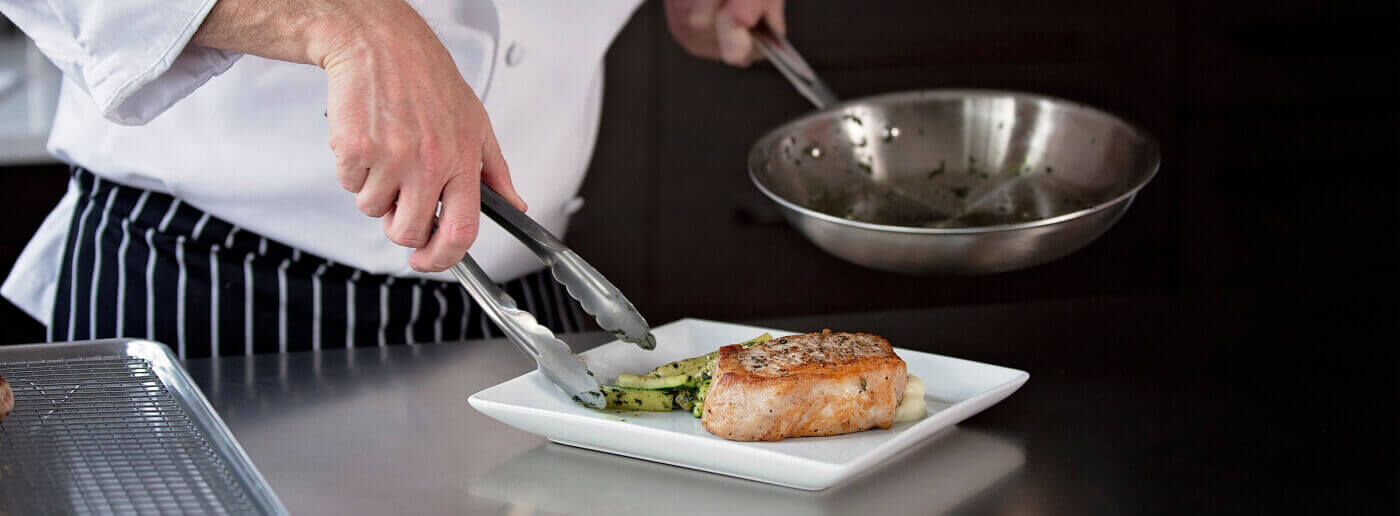
Ready to embark on an exciting journey into the world of culinary arts?

